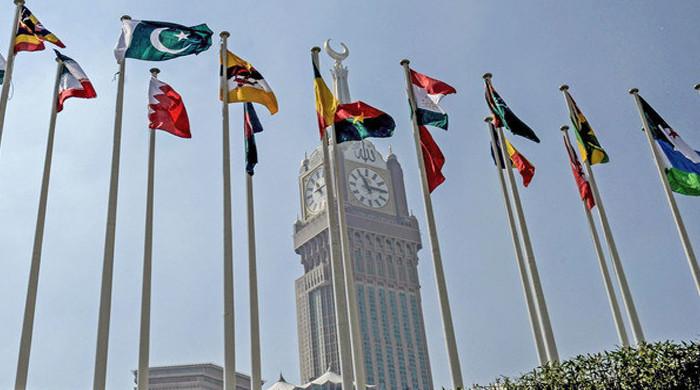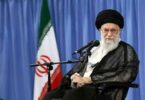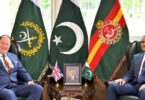JEDDAH (NNI): In an emergency meeting held today, the Organisation of Islamic Cooperation (OIC) has emphasised the crucial need for collective measures to prevent the desecration of the Holy Quran.
The call comes in the wake of a distressing incident where the holy book was burned during a protest in Sweden, sparking outrage and deep concern among the Muslim community worldwide. Video Player is loading.
The statement by the Organisation of Islamic Cooperation, most of whose members have a Muslim-majority population, was issued after an extraordinary meeting in Saudi Arabia’s Jeddah called to discuss Wednesday’s incident.
“We must send constant reminders to the international community regarding the urgent application of international law, which clearly prohibits any advocacy of religious hatred,” OIC Secretary-General Hissein Brahim Taha said.
The intergovernmental organisation of 57 countries said in a statement that the meeting had been called by Saudi Arabia in its capacity as chair of the Islamic Summit Conference and would take place at the OIC headquarters in the Saudi city of Jeddah. The emergency meeting would also go over the procedures for dealing with the fallout from the incident, it added.
In a conversation with the Secretary General of the Organization of Islamic Cooperation (OIC) Hissein Brahim Taha, Iranian Foreign Minister Hossein Amir-Abdollahian called for an emergency meeting of the foreign ministers of the OIC in light of the recent act of blasphemy of burning the Quran in outside a Mosque in Sweden.
“The OIC foreign ministers should hold the meeting at the earliest possible time to address the desecration,” Amirabdollahian said.
Amir-Abdollahian pointed out that the OIC meeting can be made concurrently with the Ministerial Meeting of the Coordinating Bureau of the Non-Aligned Movement in Baku, Azerbaijan, on July 5-6.
A man tore up and burned the Holy Quran outside Stockholm’s central mosque on Wednesday, the first day of the Muslim Eid al-Adha holidays.
The act angered OIC member Turkey whose backing Sweden needs to gain entry to the NATO military alliance.
Swedish police had granted permission for a protest to take place. But after the burning, police charged the man who carried it out with agitation against an ethnic or national group.
The incident has triggered large protests in Baghdad in front of the Swedish Embassy. It has also been condemned by the United States.
Turkey in late January suspended talks with Sweden on its NATO application after a Danish far-right politician burned a copy of the Holy Quran near the Turkish embassy in Stockholm.
Pakistan had earlier this week strongly condemned the “despicable act” of the public burning of a copy of the Holy Quran.
“Such wilful incitement to discrimination, hatred and violence cannot be justified under the pretext of freedom of expression and protest,” a statement issued by the Foreign Office in condemnation of the abhorrent incident read.
The FO stated that international law binds all the states to prevent and prohibit any advocacy of “religious hatred” that leads to incitement of violence.
“The recurrence of such Islamophobic incidents during the last few months in the West calls into serious question the legal framework which permits such hate-driven actions.”
The FO, on Pakistan’s behalf, reiterated that the right to freedom of expression and opinion does not provide a license to stoke hatred and sabotage inter-faith harmony.
It said that the concerns regarding the matter were being raised with the government of Sweden.
It also urged the international community and the national governments to undertake credible and concrete measures to prevent the rising incidents of xenophobia, Islamophobia and anti-Muslim hatred.







